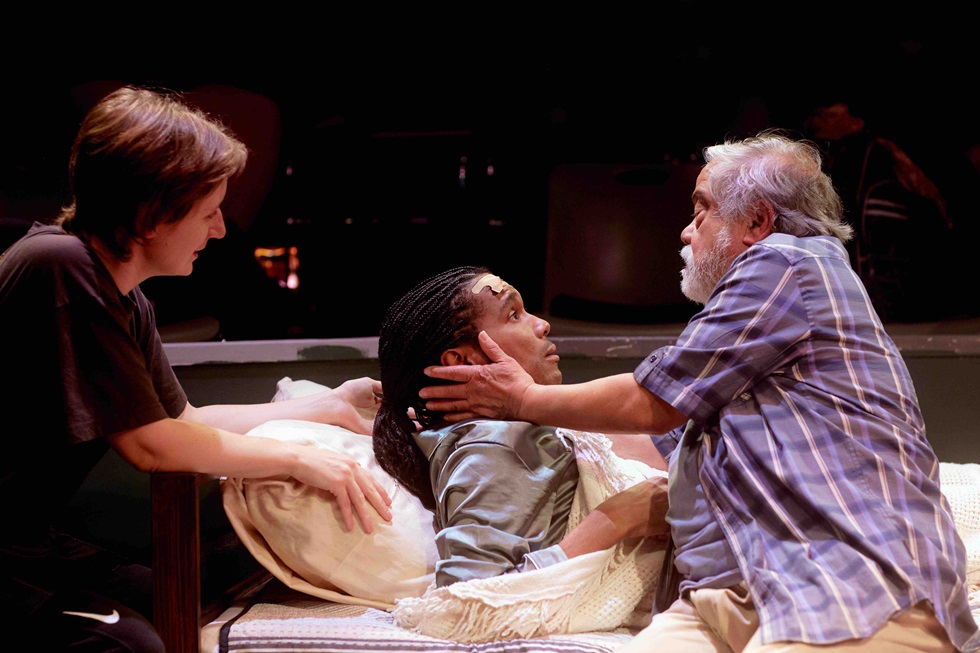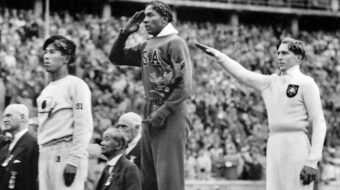
LOS ANGELES — Anton Chekhov’s 1901 Three Sisters continues the Russian playwright’s fascination with his country’s educated middle class, a slender slice of the population in his day, caught between the high-living parasitic aristocracy of the gluttonous Czarist empire and the vast lower classes of landless peasants and exploited factory workers. His portrayal of the aimlessness, anomie and lack of will of these feckless characters can be seen as a precursor to the social strains that would erupt in revolution only a few years later, even as world war terrorized the European continent.
Curiously, Chekhov (1860-1904) titles his play recognizing only three of the four Prozorov siblings: Besides the three sisters, Olga, Masha and Irina in chronological order, there’s also a brother, Andrei, a weak nebish with unrealized talents who has married a dominating shrew (Natasha)—and yet it is he, alone among the family, who has any children. With the moral decay of this middle class, it’s hardly a wonder that the only people left to effectively govern after the czarist regime was overthrown were the forces of the organized working class.

In Nick Salamone’s new world premiere “queer meditation” on Chekhov, the siblings revel in a song they learned in childhood from their parents, “Ta-ra-ra Boom-de-ay.” In the boisterous delivery during the play I could barely distinguish lyrics, but most versions of this much parodied song from the 1880s (reputedly first heard performed by a Black singer in a St. Louis brothel) celebrate fearless joy as a life force in the face of hopelessness. In a version popularized by singer Lottie Collins in a vaudeville show called Tuxedo, the lyrics read, “A sweet Tuxedo girl you see / A queen of swell society / Fond of fun as fond can be / When it’s on the strict Q.T. / I’m not too young, I’m not too old / Not too timid, not too bold / Just the kind you’d like to hold / Just the kind for sport I’m told.” The frivolously suggestive tone of the song stands in neon contrast to the morbidly depressed denizens of the play.
At one point Masha rhapsodizes on Russian drama as a tiresome soap opera in which nothing happens. The sisters’ lovers, their birthday parties, their unglamorous schoolteacher or bureaucratic careers, Andrei’s shy retreats to play the cello in his bedroom, the doctor’s humble ministrations to the sick: It all amounts to lives spent without purpose, meaning or result. People today who piss and moan about the state of the world yet take no action beyond incessantly wringing their hands, please take note.
Salamone recasts THREE (the last E is reversed, hinting at the Russian letter and also at the queer features that crop up later in the play) in four “acts” evenly divided by one intermission. Act 1 takes place in “a fictional army base in the far north of the upper Midwest” at the end of World War II in1946. The occasion is Irina’s birthday. The several military characters in Chekhov’s original conceit are here replaced by Amelia, a returning WAC from the war, and Freddy, both not only performed by African-American actors but actually portraying African-American characters. Thus the adapter introduces new elements of gender roles and racial identity into the American context. Freddy muses that Black Americans, especially those who served, would be treated better in postwar America, but alas, the lynchings continue apace. The Prozorov patriarch, whom Amelia knew in the military, died a year before, leaving his house to the four children. Olga, in uniform, uses a wheelchair, thereby introducing yet another contemporary index of inclusiveness; one assumes she’s suffered a disabling war injury. Tuzenbach, Irina’s lovesick admirer, is a German with a Jewish father and did not serve in the war. Old family friend Dr. Kapiling and Masha’s pathetic husband Kulligan round out the cast. Now, says, Irina, “all we have to do is figure out what to do with our lives.”
In a program note, the playwright reveals that he “wanted the audience to see themselves in the characters in a direct way. I made an effort to adapt Chekhov’s characters with a concern for the diversity of gender, sexuality, race, and ethnicity that I hope will reflect our audience.”
Act 2 is set in 1982 at the beginning of the AIDS/Reagan era. A returning female vet reunites with Masha, who takes little pain to disguise her relationship for the sake of her marriage. Natasha shamelessly betrays Andrei and pursues an affair with the town mayor. The tippling doctor appears with reports of the AIDS cases he’s treating, as morbidity figures are recited—over 3000 dead so far. Irina, a post office worker, relates an encounter with a sorrowing mother trying to mail a letter of apology to her dying son in San Francisco, whose address she doesn’t have because her husband has thrown out all his letters home. Still, everyone imagines how much better life will be when we all finally return to the old family manse (in Chekhov’s Moscow, unclear here).
Act 3 takes place on the day of the Oklahoma City bombing in 1995. Natasha, the very model of the “Karen” type, is quick to blame the Muslims and terrorists, until it becomes clear that the perpetrator of the attack was an angry white Christian. Freddy was caught in the bombing and shows up badly wounded. An AIDS patient, the bomb also took out his apartment, so he is invited to live with the sisters—against Natasha’s protests about having a “diseased” person in the house with her children (at least one of whom, by the way, might not be Andrei’s). Dr. Kapiling turns to the audience in one of the play’s several break-the-fourth-wall moments to ask, “Do our own little lives matter to you? What are you here for? Art? Really?”
In the “present day” of Act 4, Irina is now under gender reassignment treatment and goes by the name Renik. The doctor will be leaving soon for a new medical position, as Freddy will also—to Ecuador, to teach. Amelia, whom we met as a returning vet in Acts 1 and 2, is now in uniform again, off to fight in some deployment where “there’s a madman and he won’t stop unless we stop him.” Masha is still in love with her, but is immobilized in her loveless marriage. Amelia knows our society and its institutions are racist, and she admits to her doubts about this new military adventure. Perhaps she suppresses her reservations just to remove herself from Masha’s indecisiveness. “The world is bigger than we are, and the world moves on,” she tells her inconstant lover. “You wanted to go back to a past that doesn’t exist for me anymore. It’s time for both of us to go on.”

In the end, the characters—almost all of them—settle on the cold comfort that they’ll be forgotten sooner than they can even imagine, the fate of all those who dully plod through their anemic lives. Ta-ra-ra Boom-de-ay!
Director Jon Lawrence Rivera has amassed a troupe of dedicated actors to bring Chekhov’s bleak but reproachful message into the 21st century. The three sisters are played by Hayden Bishop (Irina/Renik), Emily Kuroda (Olga), and Rachel Sorsa (Masha). James Liebman is their brother Andrei. Rebecca Metz takes on the ungrateful role of Natasha. Robert Almodovar is Masha’s sad-sack husband Kulligan. The family friends and lovers include: Eric B. Anthony as Freddy, Tracey A. Leigh as Amelia, Alberto Isaac as Dr. Kapiling, and Clay Storseth as Tuzenbach.
THREE is an imaginative tour de force whose particular vision is to take a torrid character study that ordinarily requires truly exceptional actors to pull off, and invite Americans to consider its significance in an intelligent and freshly illuminating staging. In the playwright’s words, “it is the examination of an existential yearning for a purposeful future that is not cut off from the past that is Chekhov’s greatest gift to us in his play.”
THREE is coproduced by Playwrights’ Arena and the Los Angeles LGBT Center. Scenic, projection and prop designs are by Lily Bartenstein, the lighting is by Matt Richter, sound design by Jesse Mandapat, and costume design by Mylette Nora. Raul Staggs served as casting director, and the dramaturg is Desiree Fernandez. Letitia D. Chang is the stage manager, and Zach Davidson is lead producer. The show runs 2 hours, 30 minutes with one intermission. Though it’s a small theater with seats on three sides, actors should be aware that quiet or even normal speaking moments can get lost when facing away from the audience in back of them.
THREE plays through March 18 at the Los Angeles LGBT Center, with performances Mon., Fri. and Sat. at 8 p.m. and Sun. at 7 p.m. The Center’s 50-seat black box Davidson/Valentini Theatre is located at 1125 N. McCadden Pl., Los Angeles 90038. For tickets and further information call 323 993-5700, or go to the Center’s website.
We hope you appreciated this article. At People’s World, we believe news and information should be free and accessible to all, but we need your help. Our journalism is free of corporate influence and paywalls because we are totally reader-supported. Only you, our readers and supporters, make this possible. If you enjoy reading People’s World and the stories we bring you, please support our work by donating or becoming a monthly sustainer today. Thank you!












Comments